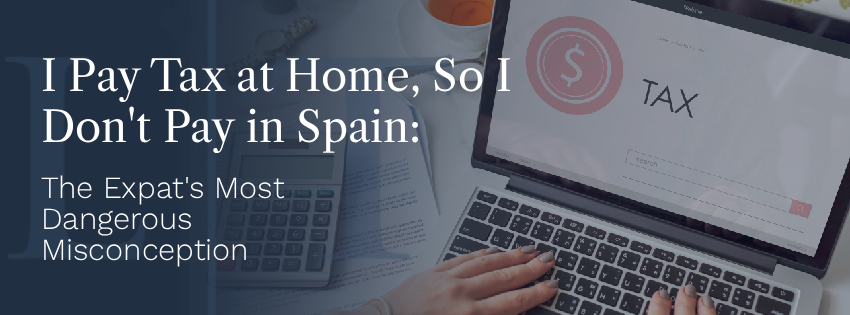You’re living the dream in Spain. You’ve handled your legal residency, set up a bank account, and you diligently file your taxes back home in the UK, the US, or Germany. You’re covered, right?
This line of thinking—«I’m already a taxpayer elsewhere, so the Spanish Tax Agency (Hacienda) has nothing to do with me»—is the single most dangerous and costly financial mistake an expatriate can make.
At LexTax, we deal with the consequences of this logical-sounding but legally flawed assumption every week. In a world of automatic global data exchange, what you don’t know can and will hurt you. This guide is designed to replace dangerous assumptions with professional clarity.
Are you sure about your tax status in Spain?
A simple misunderstanding can lead to massive penalties. Let us help you get it right from the start.
The Core of Spanish Law: Understanding Tax Residency
Let’s be crystal clear: Spanish tax law defines a tax resident based on your physical presence and economic ties, not your nationality.
The moment you spend more than 183 days in Spain within a calendar year, you are legally considered a Spanish tax resident.
Once you cross that threshold, you are obligated to declare your entire global financial life to Hacienda. This includes:
- Your foreign pension.
- Rental income from a property in Manchester.
- Capital gains from your US stock portfolio.
- Interest from a bank account in Frankfurt.
Double Taxation Agreements (DTAs) Explained: Myth vs. Reality
This is where the myth of the Double Taxation Agreement (DTA) creates a false sense of security.
The Myth: «The DTA between my country and Spain means I can choose where I pay my taxes.»
The Reality: A DTA is an instruction manual to prevent you from paying the full tax amount in both countries. It works primarily through a foreign tax credit, not an exemption. You must still file in Spain.
Let’s see a practical example:
- Your Foreign Income: You are a UK retiree living in Spain and receive a €20,000 pension. The UK taxes this at 15%, so you pay €3,000 to HMRC.
- Your Spanish Tax Return: You now file your Spanish tax return (Modelo 100). Let’s assume the Spanish tax on that same €20,000 would be 24%, which equals €4,800.
- Applying the Credit: You do not pay the full €4,800 to Spain. You declare the income, calculate the Spanish tax, and then you deduct the €3,000 you already paid in the UK as a credit.
- Final Tax Due in Spain: €4,800 (Spanish Tax) – €3,000 (UK Tax Paid) = €1,800.
As you can see, you are not exempt. You are simply «topping up» your tax payment to the higher Spanish rate. The DTA saved you from paying €7,800 in total, but it did not eliminate your obligation to file and pay in Spain.
When Theory Meets Reality: A Real-Life Case Study
Meet Robert, a 68-year-old who moved from Manchester to a beautiful villa near Denia. For three years, he paid UK tax on his pension and believed he was compliant.
Then, the letter arrived.
It was a notification from Hacienda. The Spanish tax authorities, having received his data from HMRC via the Common Reporting Standard (CRS), had identified him as a tax resident with undeclared foreign income.
The outcome was a financial nightmare:
- Back Taxes: He owed the «top-up» tax for all three years.
- Late Payment Interest: Punitive interest was applied to the entire amount.
- Penalties: He faced a 50% penalty on the tax owed for failure to declare.
- Modelo 720 Penalty: A separate, larger penalty for failing to file the foreign asset declaration for his UK bank accounts.
Robert’s logical assumption cost him over €25,000 and immense stress. This is the documented reality of Hacienda’s enforcement protocol.
Your Path to Tax Certainty: A 3-Step Action Plan
- Acknowledge Your Status: If you are past the 183-day mark, accept that you are a Spanish tax resident and have filing obligations.
- Act, Don’t Hide: If you have been non-compliant, the single best strategy is a voluntary disclosure. Proactively regularizing your situation dramatically reduces penalties.
- Get a Professional Diagnostic: Before you act, invest in a professional review. A specialist can analyze your specific DTA, check your Modelo 720 status, and build the most efficient compliance strategy.
Final Word: Trade Dangerous Assumptions for Expert Assurance
Living in Spain should be about enjoying your new life, not worrying about a sudden letter from the taxman. The rules are complex, but they are navigable with the right guidance.
Don’t let a simple, logical-sounding myth derail your financial well-being.
Your Next Step: From Uncertainty to a Clear Plan
Reading this article is the first step. The next is taking decisive action. At LexTax, we invite you to a confidential, no-obligation «Tax Residency & DTA Health Check.» In this session, we will:
- Confirm your tax residency status definitively.
- Clarify how the DTA from your specific country applies to you.
- Identify any potential risks regarding past or future filings.
- Provide a clear, actionable roadmap for 100% compliance and peace of mind.


